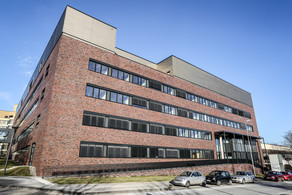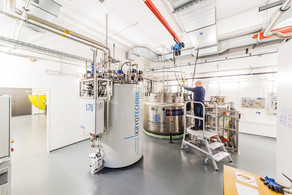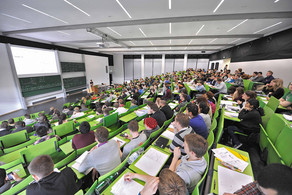Experiments at CERN honored with "Breakthrough Prize in Fundamental Physics"

At CERN, international scientists are working together to track down previously unknown particles. At the same time, they are investigating the properties and interactions of elementary particles that have already been discovered in order to clarify unsolved questions in physics. In an underground, ring-shaped tunnel with a circumference of around 27 kilometers, proton packets are accelerated to almost the speed of light and deliberately made to collide. This produces countless elementary particles. Huge detectors measure their energies and decay processes with the highest precision.
TU physicists are involved in two of these detectors: Prof. Johannes Albrecht and Dr. Dominik Mitzel are working with their teams on the Large Hadron Collider-beauty experiment, or LHCb for short. The groups of Prof. Kevin Kröninger and Dr. Chris Malena Delitzsch are researching the ATLAS experiment. The "Breakthrough Prize in Fundamental Physics" has now been awarded for all four major experiments, which in addition to LHCb and ATLAS also include ALICE and CMS - and in which a total of more than 10,000 researchers from over 70 countries are involved.
Outstanding contributions to particle physics
The prize recognizes outstanding contributions to particle physics made at the LHC over the past decade. As a universal detector, ATLAS investigates the entire spectrum of physical questions made possible by the LHC's high-energy proton and ion beams. Together with CMS, the ATLAS scientists announced the discovery of the Higgs boson in 2012 and have been analyzing its properties ever since. Among other things, the LHCb collaboration is focusing on the differences between matter and antimatter, the violation of fundamental symmetries and the complex structure of hadrons made up of heavy and light quarks.
From 2030, the discovery potential of the LHC is to be significantly increased once again with the next major upgrade of the accelerator. At TU Dortmund University, the work on the LHC is also fundamental for other projects: For example, the experiments provide important data for the planned Cluster of Excellence "Color meets Flavor", with which particle physicists* at TU Dortmund University are competing with partners in the Excellence Strategy.
About the prize
The Breakthrough Prize in Fundamental Physics was established in 2012 by technology investor Yuri Milner, who is also involved in promoting science. He initiated the Breakthrough Prizes as highly endowed awards in the fields of physics, life sciences and mathematics.
Contact persons for queries:








